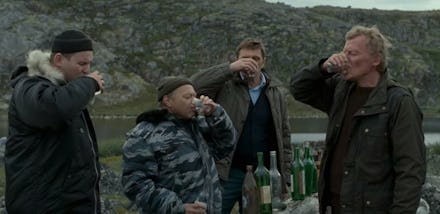Here's the Russian Oscar Contender No One in Russia Wants You to See

Leviathan, a cinematic portrait of corruption and injustice in a small northern Russian town, has taken both audiences and critics by storm. It won Best Film at the London Film Festival and Best Screenplay at the 2014 Cannes Film Festival; it also won a Golden Globe for Best Foreign Language Film and has been nominated for an Oscar in the Best Foreign Language Film category.
As the New York Times' Neil MacFarquhar put it, "In many ways, [Leviathan] is Russia's greatest cinematic accomplishment in years, maybe decades."
Yet for all its accolades, critics in Russia are taking a decidedly different position.
"Leviathan is a filthy libel against the Russian church and the Russian state," Orthodox activist Kirill Frolov wrote on his Facebook page, according to the Guardian. "I would stop worrying that we are supposedly restricting freedoms, we don't need to justify ourselves. Leviathan is evil, and there is no place for evil in the cinema."
The problems: The film, a relentlessly unkind portrait of Russian life, tells the story of Kolya, small-town man who battles against a corrupt mayor hellbent on repossessing his property. Crime and injustice are rampant, as is vodka and dishonesty.
Because of this, many are calling the film anti-Putin propaganda for its too-close-to-home portrayal of problems with corruption within the country. Mark Kermode, writing for the Guardian, called the film an "unremittingly poisonous portrait of the abuse of power in contemporary Russia."
And, despite having not been seen by the vast majority of the nation's citizens — it was released in just one St. Petersburg theater in order to meet Oscar qualifications — it's been largely dismissed by its home country. Nevertheless, it's still enough for some to write the film off entirely.
"However much the authors made them swear and swig liters of vodka, that doesn't make them real Russians," Russia's culture minister, Vladimir Medinsky, told Izvestia, a Russian newspaper. "I did not recognize myself, my colleagues, acquaintances or even acquaintances of acquaintances in Leviathan's characters. Strange, but among the movie's characters there is not a single positive one."
But the film's defenders argue that while it may be coarse, it's the truth. "I don't think it is a masterpiece, but it is a very important movie for Russia," Daniel Dondurei, dean of Russian film critics, told the New York Times. "If you thought life in Russia was horrible before you saw it, it is three times worse than you imagined."
These critiques are rooted in some truth. Despite Russians arguing otherwise, Vladimir Putin's Russia is not known for its cuddly character. Charges of corruption and criminal activity are well known, and the government has gone to great lengths to silence critics and censor independent voices.
But while it's likely that Western schadenfreude isn't entirely misplaced, the film is, in the end, just one man's rendering of his country. It doesn't mean that other facets don't exist — they certainly do — or that these issues are confined to the former Soviet Union.
In fact, Zvyagintsev says he took inspiration from the story of Marvin John Heemeyer, an American welder. "This story could happen anywhere," he told Russian newspaper MKRU. "There is no place I feel closer than Russia, so we set this plot in the Russian realities."
As for the varied reaction? Zvyagintsev considers it a measure of success. "It should have been understood that the public would be polarized, but the extreme points of view over the film show it was a success," he said recently during a press conference. "It touched something very important."